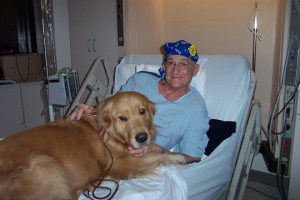The emotional and physical benefits of pet ownership are now helping people who suffer from Alzheimer’s and other forms of dementia. The concept of guide dogs for Alzheimer’s patients came out of research in Israel. Dafna Golan-Shemesh, a social worker, and her partner Yariv Ben Yosef, a dog trainer, developed a program called Alzheimer’s Aid Dog. More recently, a team in Scotland has created the Dementia Dog Project. The families involved say that they are seeing improvements in the lives of the patient as a result of their canine companion.
The dogs for dementia patients are either trained as visiting therapy dogs or as companion service dogs who live full time with the patient.
Because of their non-judgmental nature, dogs are perfect for this role. They are good companions who provide support and unconditional love.
The dogs chosen for this role have to be unfazed by mood swings and can follow all of the basic commands like sit, stay and heel. They must never jump on people, or be a biter.
There are specialized training programs for dogs to be therapy dogs. The programs may vary slightly, but the components are pretty much the same. They are:
- Leash behavior. The dogs must be obedient on any type of leash.
- Willingness to visit with a patient. The dog must be friendly, gentle, and imperturbable.
- Calmness during an unplanned situation or distraction. The canine candidate will be tested by a stranger approaching waving her arms and shouting or by a passerby dropping something that makes a loud noise when it hits the ground.
- Behavior when meeting other dogs. The canine candidate must always focus on her handler and not the other dog who is approaching.
- Good behavior around children. It is essential that the dog behaves beautifully around children because as the dementia disease progresses, the patient may develop childlike behaviors.
These well-trained service dogs could alleviate the need for other more expensive types of assistance, and will also provide companionship and empowerment.
Some of the things that dementia service dogs are trained in are:
- Getting the owner home when the command is given. Also, the dog is trained in staying with her owner and calling for help by barking if the owner gets confused and refuses to go home. The dog will also have a GPS tracker on her collar.
- Preventing the patient from leaving the house alone.
- Assisting in daily tasks like waking the patient in the morning, showing the patient where the clothes are, and bringing meds that must be in bite-proof packaging.
- Give physical support for patients who are having problems with balance, stair climbing, sitting, and getting up.
- Impact the owner’s overall emotional wellbeing by providing more independence for the patient. This will bring a sense of self-confidence to the patient who knows that she doesn’t have to rely on another person.
There are many resources for finding a home-based companion service dog. Among them are Pets for The Elderly, Assistance Dogs International, Dog Wish, Alliance of Therapy Dogs, and Pet Partners.

